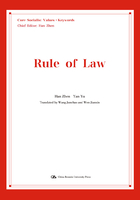
III. Historical course of building a socialist country under the rule of law
The founding of the People's Republic of China in 1949 ushered in a new era for China's promotion of the rule of law. The period from 1949 to the mid-1950s was the period when China's socialist legal system was first set up. In this period, China promulgated the Common Program of the Chinese People's Political Consultative Conference, in the character of an interim constitution, and some other laws and decrees, which played an important role in consolidating the new-born political power, maintaining social order and reviving the national economy. In 1954, at the First Session of the First National People's Congress(NPC), the Constitution of the People's Republic of China was promulgated, and at the same time, Organic Law of the National People's Congress of the PRC, Organic Law of the State Council, Organic Law of Local Government, and Organic Law of the Courts and Procuratorate was promulgated. These laws defined China's political and economic systems, citizen's rights and freedom, set the standards for the organizational structure, functions and powers of state organs, and established the basic principles for China's legal system, thus initially laying the foundation for the rule of law in China.
From the late 1950s, and especially during the chaotic period of the “Cultural Revolution”(1966-1976), China's socialist legal system was severely damaged by ultra-left trend of thought and legal nihilism.
At the end of the 1970s, the CPC, after summarizing historical experiences, and especially learning painful lessons from the “Cultural Revolution”, made an important decision to shift the focus of national work to socialist modernization. To guarantee democracy for the people, it was necessary to strengthen the socialist legal system, institutionalize democracy and make laws to ensure democracy. The goal was to make the system and laws stable, consistent and authoritative, as was specified by Deng Xiaoping that “the system and the laws shall not change with changes of state leaders or state leaders' opinions or attention”. The guideline put forward by the CPC was that there should be laws to go by, laws should be observed and strictly enforced, and lawbreakers should be prosecuted. Under the guidance of the basic principle of developing socialist democracy and improving the socialist legal system, China promulgated the present Constitution and basic laws, such as the Criminal Law, Criminal Procedure Law, Civil Procedure Law, General Principles of the Civil Law and Administrative Procedure Law, ushering in a new development stage of the rule of law.
In the 1990s, China started to promote the development of a socialist market economy in an all-around way, further laying the economic foundation and putting forward higher demands for the rule of law. In 1994, the Third Plenary Session of the 14th Central Committee of the CPC for the first time in history made up the decision of establishing the socialist market economy system and put forward the task of building a legal system for the socialist market economy. In 1997, the 15th CPC National Congress decided to make “the rule of law” a basic strategy and “building a socialist country under the rule of law” an important goal for socialist modernization, and put forward the significant task of building a socialist legal system with Chinese characteristics. In 1999, “the People's Republic of China exercises the rule of law, building a socialist country governed according to law” was added to the Constitution, ushering in a new chapter in China's efforts to promote the rule of law.
Entering the 21st century, China is continuing this undertaking. In 2002, the 16th CPC National Congress decided to take further improvement of the socialist democracy and socialist legal system, comprehensive implementation of the rule of law as important goals for building a moderately prosperous society in all respects. In 2004,“the state respects and guarantees human rights” was included in the Constitution. In 2007, the 17th CPC National Congress expressly called for comprehensively implementing the fundamental principle of ruling the country by law and speeding up the building of a socialist country under the rule of law, and made arrangements for strengthening the rule of law in an all-around way. In 2012, the 18th CPC National Congress emphasized on promoting law-based governance of the country in an all-around way. Implementing rule of law comprehensively, establishing a law-based government, improving judicial credibility, respecting and protecting human rights were considered as the goals of building a moderately prosperous society in all respects. Rule of law was included in socialist core values.
Since the founding of PRC, especially during more than 30 years since the introduction of the reform and opening up policies, the basic strategy of rule of law and governing the country by law has been established, the socialist legal system with Chinese characteristics has been formed, a law-based government has been built, judicial system has been completed and the public concept of rule of law has been improved through unremitting efforts. Simply put, China has made tremendous achievements in promoting the rule of law.